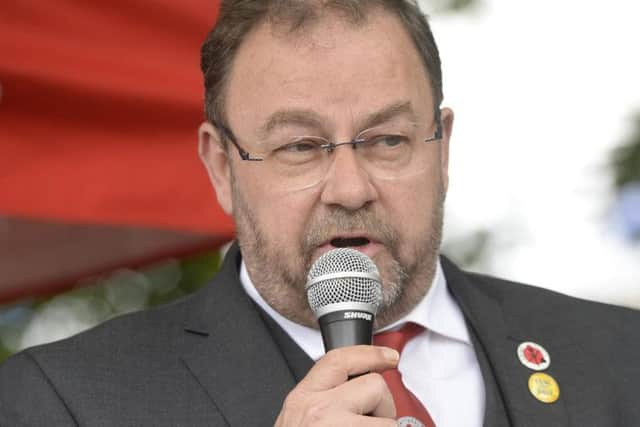EXCLUSIVE: National Union of Mineworkers backs Lisa Nandy for next Labour leader
NUM General Secretary Chris Kitchen said Wigan MP Ms Nandy was who “Labour needs to rebuild the party and regain trust with the voters we’ve lost”.
Although membership of the NUM fell with the privatisation of the 15 state-owned coal mines still in operation in 1994, the union has remained influential due to its role in the miners’ strikes during the 1980s and the emotional tie many coalfields community have to the industry.
Advertisement
Hide AdAdvertisement
Hide AdAnd Ms Nandy said having their backing was “really personal”.


She said: “I represent a former coalfield community. I’m really proud of that, and I am really proud to work alongside the NUM since I was first elected.
“Former coalfields and towns are crying out for real change. Some of these areas are part of the famous red wall that fell in the last election. I get it. If Labour wants to be part of making that change happen, we have to go back out into our communities and fight for it.”
Ms Nandy said thousands worked down the pits in her constituency, and recognised whole communities were built on mining.
Advertisement
Hide AdAdvertisement
Hide AdShe said: “When that way of life was destroyed by Thatcherism it left a massive gap that successive governments have failed to address. Whilst some efforts were made by the last Labour Government, it failed to implement the long-term industrial strategy that is necessary.


“Permanent, stable jobs have been replaced by short-term work in the gig economy, from call centres to packing depots to takeaways – economically insecure and accompanied by the erosion of the rich social fabric built around mining communities.
“It is so important to me that we as a Labour movement prioritise the regeneration of coalfield communities right across the United Kingdom, from Barnsley to Bannockburn to Blaenau.
The first debate Ms Nandy led in the Commons in 2010 was on coalfield regeneration.
Advertisement
Hide AdAdvertisement
Hide Ad“I said then and I believe now that that our mining communities are a ‘a great British tradition…and they are the last people who should be paying for others’ actions that led to the financial crisis.’ It hurts me that a decade on from that speech, the problems facing our communities have multiplied,” she said.
She added: “Our proud communities deserve so much better and these issues matter to people in areas like ours – what jobs and opportunities we create in the place of what went before but also the cultural benefits that are too often confined to metropolitan areas.
“But healing the bitter legacy of Thatcher must go beyond this. We need to heal the many open wounds that still fester from the Miners’ strike.
“In 2014 I raised at PMQs the Cabinet papers that finally revealed what you knew all along - that the Conservative Government under Margaret Thatcher set out to deliberately escalate the miners’ strike, to push communities to the brink and crush their way of life.
Advertisement
Hide AdAdvertisement
Hide Ad“I called for the Conservatives to apologise to mining communities for the damage they did and have consistently supported the calls for an Orgreave Inquiry, helping lead the Justice for the Coalfields Campaign and pushing this both in Parliament and outside.
“It is right that the 2019 Labour Manifesto contained a firm commitment to an Inquiry into Orgreave. Justice delayed is justice denied and we cannot allow any more time to pass as those who were treated so disgracefully at the hands of a weaponized state and police force are denied the truth.”
And she also addressed the mineworkers’ pension scheme.
A bitter row between miners and the Government has developed off the back of the privatisation of British Coal in 1994.
At the time, when miners and their families signed up to the pension scheme, they were told that “no more than £2bn” would be taken by the Government to guarantee the scheme over the next 25 years.
Advertisement
Hide AdAdvertisement
Hide AdBut £4.4bn had been taken from the pot over that time, leaving miners with an unfair cut.
During the election Prime Minister Boris Johnson made a "categorical" pledge that miners will soon receive their fair share of the Mineworkers' Pension Scheme.
Mr Johnson said: “We will make sure that all their cash is fully protected and returned, I have looked into it and we will ensure that's done."
But Ms Nandy said: “Miners were the backbone of our nation. They deserve a fair deal in their retirement.
Advertisement
Hide AdAdvertisement
Hide Ad“The Government has robbed £4.4bn out of the Mineworkers’ Pension Scheme since 1994, including £670m in 2018 alone, and has not made any contributions.”
She said: “Those who worked in our pits were wronged. Putting that right is an integral part of bringing our country back together, to reconnect our forgotten towns once again, and to do so by giving those communities the power and money to decide how to protect what matters to them.
“We may have inherited the past, but the future is ours to build.”
Mr Kitchen said: “Lisa Nandy is the leader Labour needs to rebuild the party and regain trust with the voters we’ve lost.
Advertisement
Hide AdAdvertisement
Hide Ad“Our executive was pleased the contest has so many outstanding candidates. The NUM is proud to back Lisa.
“She represents a coalfield community, she has stood with us in our fights for justice and regeneration and we are confident she’s the leader who can take Labour back into government once again.”
Ms Nandy is among the five contenders through to the Labour leadership contest's next stage, having secured the nominations from Labour MPs and MEPs required ahead of Monday afternoon's deadline. She is up against Emily Thornberry, Jess Phillips, Sir Keir Starmer, and Rebecca Long-Bailey.